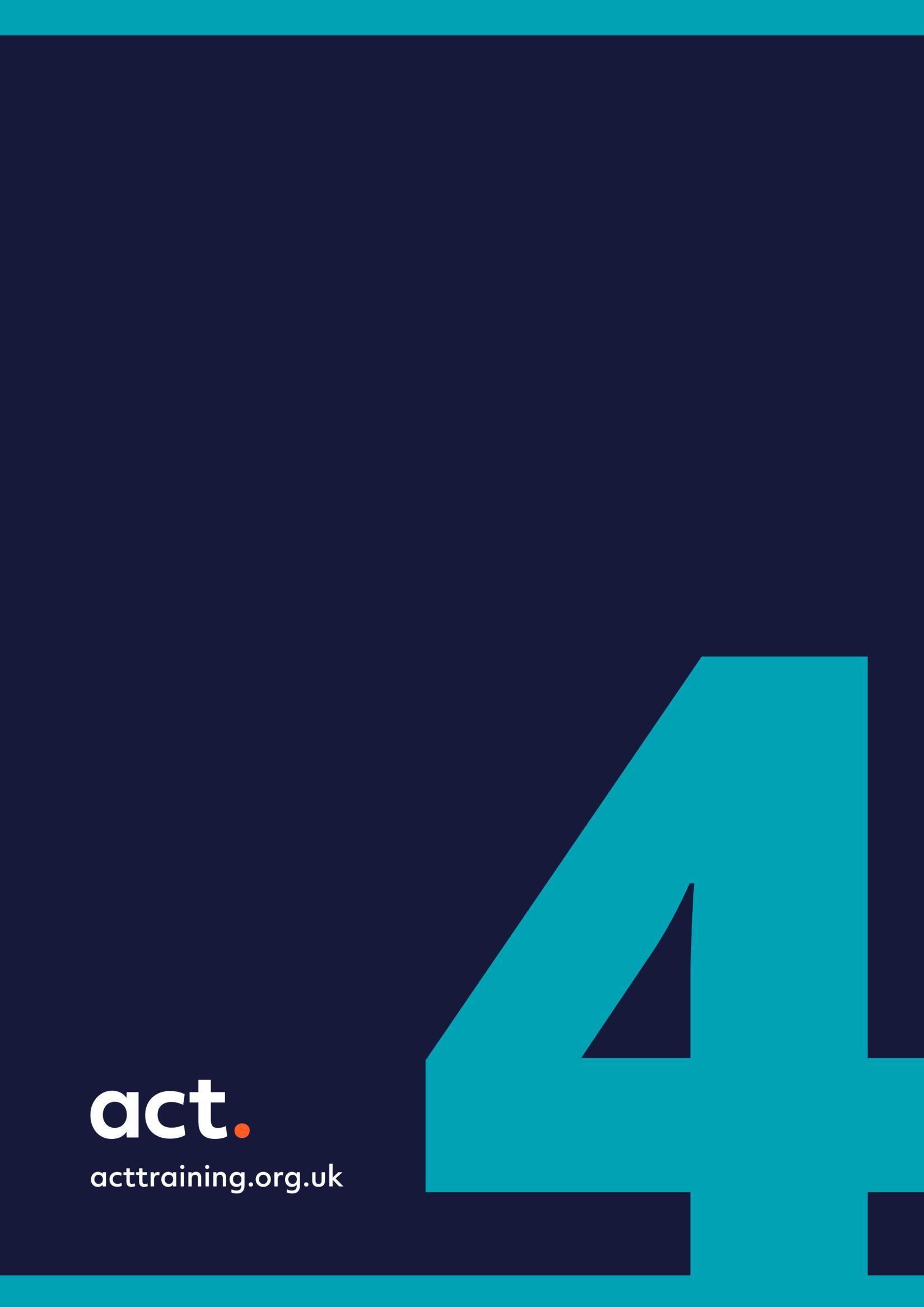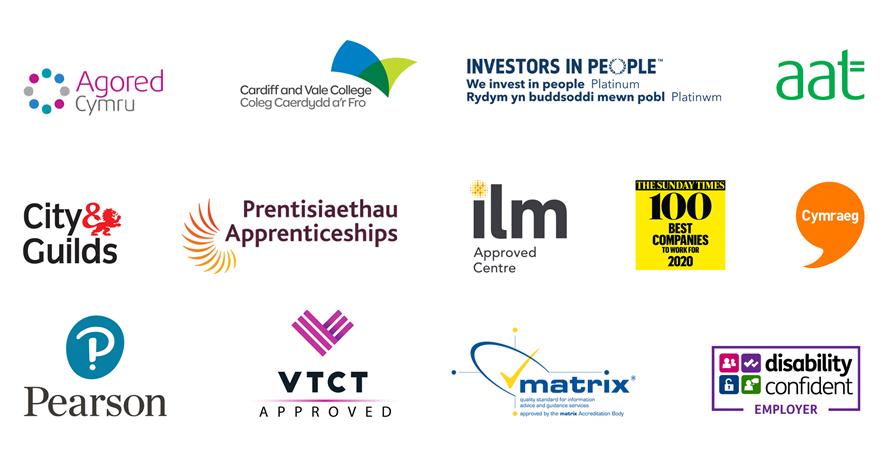

Professional Practice in Health and Social Care
- Adults
Level 4
Professional Practice in Health and Social Care
The Professional Practice in Health and Social Care Higher Apprenticeship aims to develop the knowledge, understanding, behaviours and skills that underpin Professional Practice within the Health and Social Care sector. This qualification is practicebased and assesses learners’ knowledge and practice. This qualification provides progression for learners who has completed Level 3 Health and Social Care: Practice (Adults).
Contents




Apprenticeship Framework
Level 4 Higher Apprenticeship in Health and Social Care; Adults
Essential Skills Qualifications
Welsh Language Development


Apprenticeship Framework
The aim of the Professional Practice Health and Social Care higher apprenticeship is to provide learners with the skills and knowledge required for professional practice within health and social care settings. The programme is aimed at learners in roles who support adults and who exercise autonomy and judgement within limited parameters, such as Senior/Social Care Workers or Senior Support Workers.
For more information, please visit: https://socialcare.wales/registration
Successful completion of this qualification will enable learners to work with more autonomy and responsibility as a qualified Level 4 Health and Social Care Senior Care Worker specific to their job roles. Please refer to the ‘Qualification framework for social care and regulated childcare in Wales’, which can be accessed on the Social Care Wales’ website, below: https://socialcare.wales/resources/qualificationframework-for-the-social-caresector-in-wales
Who is this apprenticeship for?
This programme is for individuals who are currently working in the health and social care sector who require the qualification for Social Care Wales purposes. It is suitable for;
• Learners who have successfully completed the Level 2/3 Health and Social Care: Practice qualification
• Learners who understand, lead and apply in practice, person-centred approached
• Learners who lead, promote and support effective practice within Health and Social Care and are aware of key policies within the sector to understand how these affect service development and delivery
• Learners who are in a role where they are leading practice of others and individuals in the setting.
Overview
There are four different pathways for this qualification and learners are able to choose any one of these four pathways as long as they are in the role. They range between 62 and 65 credits.
1. Leading support for reducing restrictive practices through positive approaches for behaviour*
2. Leading practice with individuals living with mental ill-health*
3. Leading practice with individuals living with dementia*
4. Leading practice with individuals living with a learning disability/autism*
* Learners will also be required to complete unit 410 (Legislation, theories and models of person centred approach) and unit 420 (Professional Practice)
On completion of this higher apprenticeship, you will achieve the following:
• City and Guilds Level 4 Professional Practice in Health and Social Care; Adults
• Level 2 Essential Skills: Communication
• Level 2 Essential Skills: Application of Number
• Level 2 Essential Skills: Digital Literacy
• Prentis-Iaith Welsh Language Development
On the following pages, you will find information relating to the main qualification (Level 4 Health and Social Care), as well as other aspects that will make up this apprenticeship programme, including Essential Skills and Welsh Language Development.

Level 4 Professional Practice in Health and Social Care – Adults
Length of time to complete
We will tailor your learning programmes to suit your needs, so that each learner’s experience is unique. While learner’s needs will be different, the recommended time to complete this programme is 22 months.
Course Delivery
This qualification is split up into a variety of tasks. They will be delivered through a mixture of online remote learning sessions and 1-to-1 sessions with tutors and an assessor. The online sessions will take place once a month which could be between one to three hours long. Assessments will take place with your ACT assessor and with a City and Guilds external assessor. Written assignments and oral assessments will require learners to have good verbal and written communication skills and it is essential for learners to be undertaking managerial responsibilities on a regular basis in order to collect product evidence for their portfolio.
Course delivery plan – 22 months:
4
• Attend Task B (iii) workshop
• Complete sample case study within 1 week – this to be marked and assessed within 1 week.
• Review with assessor and assessor book learner in for live written assessment – 2 weeks pre-book.
5
• Attend mandatory face to face assessment
• Review with assessor
6
7- 9
• Attend Task C workshop and complete evaluation assignment within 4 weeks
• Task B-C to be submitted for external assessment
• Review with assessor and feedback on assignment.
• Discuss building up a portfolio of evidence for Task A
• Attend Task D (i) workshop preparation for project plan
• Complete plan in 8 weeks and gain managers approval in planned approval meeting with manager and assessor
• Review with assessor and support for project. Gather evidence for portfolio. Discuss Task D(ii)
10 – 15
16 – 19
• Carry out the project over 16 weeks *2 observations and reflective logs (amount to be agreed with your assessor)
• 4 x reviews with assessor. Gather evidence for portfolio
• Time for support for the practice element. Use this time to mop up on any knowledge. Submit portfolio of evidence
• Complete a professional discussion with your assessor (Task D iii)
• Monthly reviews to continue monthly
• ESW’s to close down
• Completion of framework
180 minutes
20-21 • Portfolio to be submitted for final check and any actions needed to be completed.
What you will learn
To achieve the Level 4 qualification, learners must choose one of the mandatory pathways and learners will also be required to complete Legislation, theories and models of person-centred approach and Professional Practice
Mandatory Units
• Legislation, theories and models of person-centred approach
• Professional Practice
Pathway Units (1 to be selected)
• Leading support for reducing restrictive practices through positive approaches for behaviour
• Leading practice with individuals living with mental ill-health
• Leading practice with individuals living with dementia
• Leading practice with individuals living with a learning disability/autism
Workshops
We run a series of workshops that will help learners develop the knowledge needed for the programme. Workshops are delivered using online programmes such as Microsoft Teams on a 1-1 basis or group basis with the learner’s assessor. This will be planned to suit the learner’s availability.
We have provided an overview of these workshops below.
Workshop 410.1A – Legislation, conventions and guidance
This workshop will cover:
• Equality and rights
• Person-centred practice
• Safeguarding
• Welsh language
• Advocacy
• Preparation for assignment writing
Workshop 410.1B – Supporting person-centred practice
The workshop will be on exploring a number of theories and models that are used to support person centred practice and how these theories and models can be applied within person centred practice to support the well-being, rights and liberties of individuals. A reference of theories/models that cover each of the following factors:
• biological
• sociological
• psychological
This workshop will also support preparation for assignment writing
Workshop number 410.1C – How to promote voice and control of individuals
Workshop based on how you promote voice and control of individuals and your learning of the following topic areas in your responses:
• Dignity and respect
• Citizenship and inclusion
• Advocacy and co-production
This workshop will also support preparation for a written case scenario
In addition to attending workshops, you will be required to collect a number of pieces of evidence. Your assessor will discuss these with you in greater detail, but a summary is below:
1. Portfolio of evidence. Provide any ‘showcase’ examples of evidence that capture key activities and achievements that you have undertaken as part of your practice from across the period of assessment. Examples may include workplace documentation / products, witness testimony, question responses, reflections, supportive case studies.
2. 2x Written assignments, written case scenario and Written Evaluation (all externally assessed)
3. Project:
a. Written plan.
b. Implementation of the project to include 2 observations and a reflective log must be kept
c. Professional discussion
Have any questions about our Level 4 Professional Practice in Health and Social Care?
We are here to help. If you have any further questions or enquiries about the main qualification element of the programme, please contact our Route Manager:
Hannah Piles Route Manager for Health and Social Care hannahpiles@acttraining.org.uk

Essential Skills Qualifications
When you agree to undertake an apprenticeship, you may be required to complete Essential Skills as part of your Apprenticeship framework.
What are Essential Skills?
The Essential Skills Wales (ESW) will be initially assessed via an online Wales Essential Skills Toolkit (WEST) Assessment. If a Learner already holds an ESW certificate or equivalent qualification this can provide a proxy and learners will not need to complete that ESW element of the programme. Where a Learner is not exempt an Individual Learning Plan (ILP) will be generated from the initial WEST assessment. The modules delivery will include independent learning via WEST, prior to guided learning sessions preparing the Learner for their assessment. ESWs are assessed via controlled tasks and confirmatory tests for Communication and Application of Number, Digital Literacy is assessed via a controlled task and structured discussion.
Proxy
If you already hold qualifications, these may be used as ‘proxy’ towards your apprenticeship framework. As a result, you will be exempt from achieving that particular Essential Skill, if you wish. This will be discussed with you before you sign up. Below are some examples, although this list is not exhaustive.

Welsh Language Development
As part of your Welsh Government funded framework, you will be supported to develop and maintain your Welsh language skills for the workplace.
What is Welsh Language Development?
ACT are committed to playing their part in the Welsh Government Million Speakers strategy. All learners will complete the Prentis-Iaith Welsh Language Development course as part of your framework with us.
Don’t panic – this is as a means of development and is aimed to support you with the development of your Welsh Language skills. This course is specially designed to give apprentices a basic knowledge of Welsh for the workplace and consists of 6 interactive modules to complete online. The course will be completed throughout your framework, with support from your assessor.
Already bilingual?
If you are Welsh speaking you will be able to undertake your learning bilingually. In practice this means that you can choose the elements of your learning that you would like to complete through the medium of Welsh. You will be able to discuss your particular preferences with your assessor.
